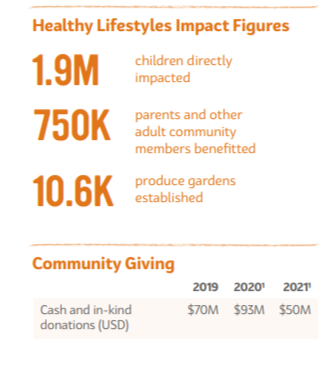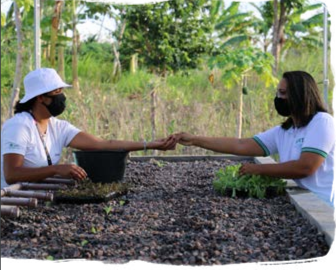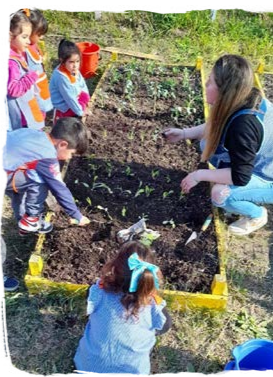Mondelēz 2021 Snacking Made Right Report: Community Impact
Mondelēz 2021 Snacking Made Right Report
In 2021, we continued to migrate our impact investing through our Sustainable Futures strategy, as we completed the Mondelēz International Foundation multiyear program to help children and families adopt lifelong healthy habits.
Mondelēz International Foundation (MIF)
As a responsible global company, we seek to support others in times of greatest need. For many years, alongside its work to promote nutrition, the Mondelēz International Foundation has supported communities by working with a disaster relief funds managed by the IFRC and ARC (International and American Red Cross organizations). We will continue to engage with the ARC, IFRC and other NGOs via grants and matching funds to colleagues’ gifts. This will better enable us to help with disaster relief across the world, supporting communities and people to withstand and overcome the most severe disasters like earthquakes, hurricanes, flooding and disease.
Encouraging Lifelong Healthy Habits
MIF has achieved a great deal over the years – partnering with leading community organizations to transform the lives of millions of children across 18 countries since the start of the company. Through the Healthy Lifestyles program, MIF has invested $50 million and partnered on a variety of programs to help children and their families adopt lifelong healthy habits. Over the years, the impact has been considerable – a 34% increase in children knowing what good nutrition is, a 13% increase in children being physically active for at least 30 minutes a day, and a 25% increase in children eating more fruits, vegetables and other fresh foods.
Tracking Progress
Each partner tracks and documents progress against a set of global healthy lifestyle metrics developed in partnership with experts from Yale School of Public Health. More importantly, each program implements these common measures to evaluate all programs against the same global metrics. Certain programs also measure Body Mass Index (BMI) or the percentage of participants with BMI in normal range.
Investing in Healthy Lifestyles Programs across the World: Lessons Learned
In late 2021, the MIF commissioned a report by the Yale School of Public Health to review the overall impact and potential for longevity of all 19 programs funded through the Foundation’s $50 million Healthy Lifestyles commitment.
Over 300 program documents were reviewed to evaluate the following key dimensions for each program:
- Co-design and co-implementation with key stakeholders;
- Reach;
- Effectiveness;
- Adoption, not only by participating schools, but also families and community members;
- Dissemination potential to other schools and communities, or through local government entities;
- Maintenance or sustainability (e.g., what is required to run the program, training materials, satisfaction of key stakeholders, etc.); and
- Innovation
"Overall, MIF should be commended for having partnered with very solid and experienced organizations that believed in community-engaged approaches to program development and delivery, and for ensuring that socio-economically disadvantaged children were included in all programs supported. [My] analysis… clearly illustrates the importance of school vegetable gardens to improve the quality of meals and snacks consumed in the schools and even at home! These produce gardens truly captured the interest and imagination of children, teachers, school food service staff, parents, and community leaders alike."
Rafael Pérez-Escamilla, PhD
Professor of Public Health & Director of the Office of Public Health Practice Yale School of Public Health
Best-in-class School-based Healthy Lifestyles Programs
Both South Africa and Brazil’s Health in Action (HIA) programs are innovative, school-based programs meant to reduce obesity rates and promote healthy lifestyles among disadvantaged children. An initiative of INMED Partnerships for Children and the Mondelēz International Foundation, HIA combines participatory education in nutrition and healthy choices, access to fresh food via school gardens and regular break-time fitness activities. The program is facilitated by INMED’s South Africa and Brazil entities, respectively, both registered local NGOs. In addition to improving access to fresh food, school gardens are used as living “learning laboratories” where children are exposed to different academic disciplines, such as agriculture, food systems, nutrition, science, biodiversity, and environmental sustainability.
HIA South Africa followed a highly participatory and iterative approach that engaged school, community, and government stakeholders in the codesign of the program. A key aspect of the program from its inception was its “climate-smart” aquaponics technology for increasing access to fresh, nutritious foods.
Similarly, HIA Brazil was an exemplar of how important it is to co-design school-based healthy lifestyles programs with local communities from the get-go. The success was in establishing the produce gardens and getting not only the students, but also teachers, school principals, school food services, families, and communities engaged with them. It had the added component of not only focusing on nutrition and obesity prevention, but also on other key public health problems affecting lowincome children in Brazil.
The Mondelēz International Foundation and Fundación Huerta Niño partnership began in 2018 with the goal of improving nutritional knowledge, increasing physical activity amongst school-aged children, and promoting access to fresh produce of high nutritional quality for lowincome children across Argentina.
The central concept of the program was the establishment of tailored garden spaces at each school site. Experiential learning in the garden space was considered the basis of strengthening nutritional knowledge and the incorporation of healthy eating habits. The project was highly innovative, as the produce gardens were co-designed with each respective community. As a result, no two produce gardens were alike. This degree of customization allowed for carefully adapting the produce gardens to the specific needs and wants of each school and community.
"The work done by social partners such as INMED and Mondelēz International is very vital for the department. It improves both learner enrichment and education outcomes."
Thembisa Futshane, Chief Director for Education and Social Support Services, South Africa Eastern Cape provincial department
"What happens in schools will happen in society. Working together is essential to generate a support network for children through the improvement of well-being in their community and in the care of the environment that shelters them. Our work in the field, supported by the Mondelēz International Foundation's sustainability strategies, made the improvement of the quality of life of thousands of children and the possibility of having greater opportunities for the future, a reality."
Barbara Kuss, Executive Director, Fundación Huerta Niño, Argentina
"The Health in Action program was very gratifying and important, especially for the students. We could work on certain principles, such as a sense of responsibility, encouragement and care for the environment, and food origin, [and] mainly to encourage awareness of healthy eating."
Renata Noblat, Principal of the Nossa Senhora do Pilar school, Brazil




